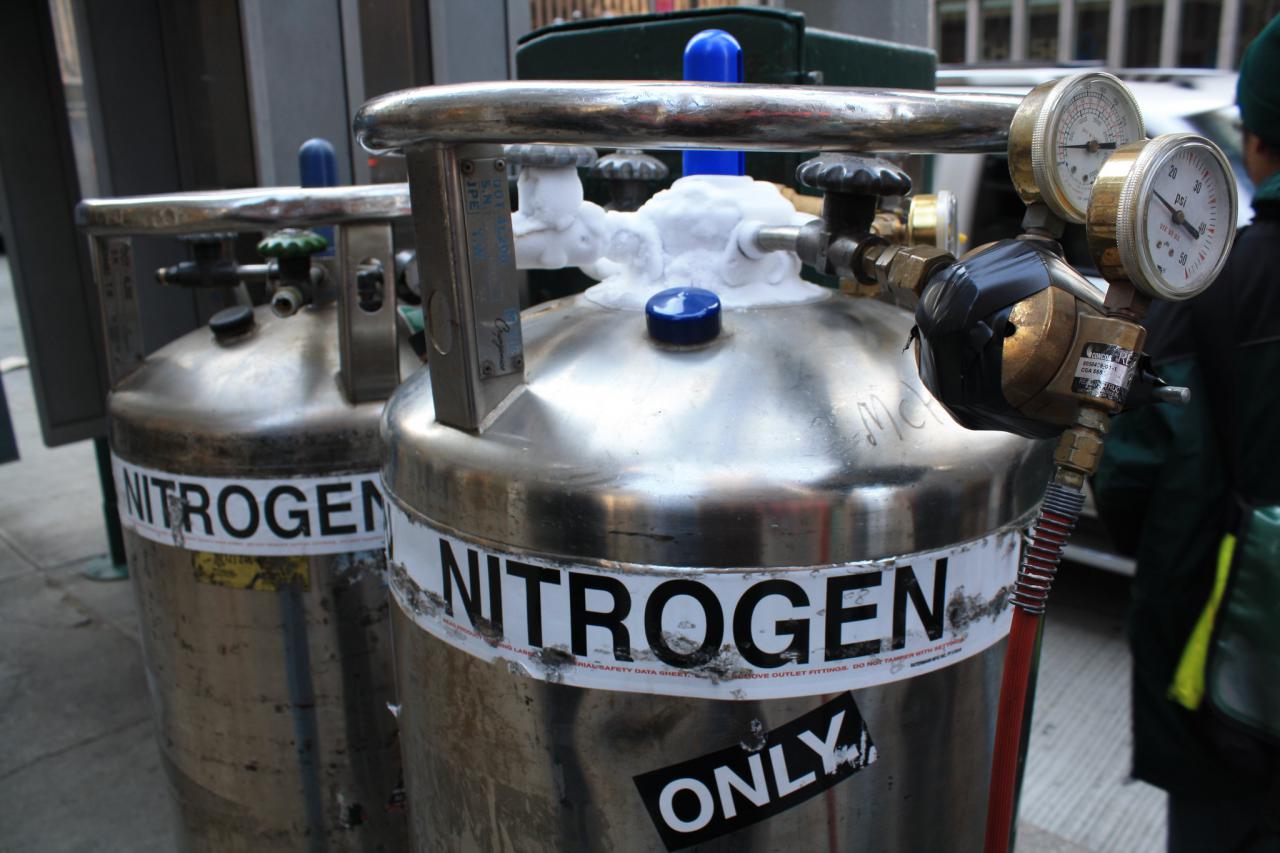Leading scientists to UN: Slash nitrogen waste — or else!
We're not the only region working to stem nitrogen pollution. Scientists are calling on the United Nations to focus on this serious issue worldwide. (Photo by Danielle Scott: Nitrogen Tanks; CC BY-SA 2.0)
Too much of a good thing
Nitrogen is one of the building blocks of life on earth, but it's become a big problem because we're using so much of it — and wasting much of what we produce.
Take the agriculture industry for an example: Crops love nitrogen, so farmers feed them with nitrogen-containing fertilizers like manure, ammonia and urea. However, in a rainstorm, these nutrients can be washed off the fields and into water bodies where they trigger the explosive growth of algae blooms that harm aquatic plants and animals. Making that fertilizer also requires massive amounts of energy and produces byproducts like methane, an extremely potent greenhouse gas. Meanwhile, nitrogen that gets into our drinking water supply can sicken humans and in some cases leads to cancer.
It adds up to a scary picture, which is why hundreds of leading scientists have penned an open letter urging the United Nations to renew the focus on nitrogen pollution. The full text is below:
INMS letter to UN Secretary-General
Dear Mr Guterres,
Global action on nitrogen is essential to tackle the current environmental crisis.
As representatives of the global scientific community, we draw your attention to the global nitrogen challenge facing humanity. If we want to beat climate change, air pollution, water pollution, biodiversity loss, soil degradation and stratospheric ozone depletion, then a new focus on nitrogen will be vital.
The present environmental crisis is much more than a carbon problem. Nitrogen is almost everywhere relevant across the Sustainable Development Goals, but is currently invisible. Nitrogen poses a threat to the health of humans, animals and plants, and to livelihoods globally. It has many forms: ammonia and nitrogen dioxide are dangerous air pollutants, nitrate is devastating ecosystems in our rivers, seas and soils, and nitrous oxide is a greenhouse gas 300 times more powerful than carbon dioxide. The current lack of policy coherency risks nitrogen trade-offs, while failing to harvest synergies at local, regional and global scales.
Nitrogen is not just another problem, but must be part of the solution. Sustainable nitrogen management would help prevent millions of premature deaths, help ensure food security, and simultaneously help protect wildlife and the ozone layer. Globally, nitrogen losses from crop, meat and dairy production, transport, energy and wastewater represent a massive resource waste of $200 billion annually. An ambitious goal to ‘Halve Nitrogen Waste’ from all sources globally by 2030 would save $100 billion per year, while mobilizing innovation to beat pollution globally. We are committed to support work on this goal. We now call on UN Member States to wake up to the challenge.
We welcome the planned launch of the UN Environment Programme ‘Sustainable Nitrogen Campaign’ on 23-24 October under the leadership of H.E. President Sirisena of Sri Lanka as a contribution to United Nations Day 2019. We ask you to raise the nitrogen challenge with world leaders, building awareness of both the urgent need and the opportunity.
Yours sincerely,
Prof. Mark A. Sutton
Environmental Physicist, Centre for Ecology & Hydrology (CEH), UK
Director, GEF UNEP International Nitrogen Management System (INMS)
Director, UKRI GCRF South Asian Nitrogen Hub
Co-chair, UNECE Task Force on Reactive Nitrogen (TFRN)
co-signed by 197 signatories from 44 countries
cc. H.E. Maithripala Sirisena, President and holder of the environment portfolio, Sri Lanka
Inger Andersen, Executive Director of the United Nations Environment Programme
Join us!
FMR's Water Program is working with farmers and others in the agriculture industry to reduce nitrogen usage and runoff. Sign up as a River Guardian and we'll email you when there's a chance to act quickly online for the river. Plus you'll be invited to special events like educational happy hours.
Read more from our Water Blog.
